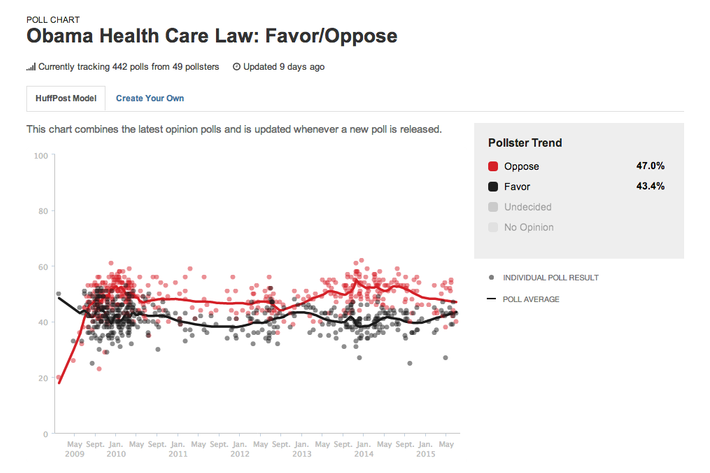
The 16th Amendment to the Constitution, authorizing the federal income tax, was ratified in 1913. Still, every once in a while, the news will report the arrest of some right-wing kook who has failed to pay his income tax on the grounds that it’s illegal. Also in 1913, the 17th Amendment, requiring the popular election of senators (who before then were often appointed by state legislatures) took effect. And yet many conservatives still want to repeal it — and not just kooks, or at least influential kooks and not just completely marginal and obscure kooks. And those things happened more than a century ago.
So how long will the Obamacare resistance live on? A long, long time.
Obamacare has survived when it appeared to be dead in Congress in 2009, then even more dead the next year, and then survived a Supreme Court case, a presidential election, a rollout crisis, and another Supreme Court case. National Journal’s Josh Kraushaar has lovingly tended the flickering flame of health-care repeal for years. In 2013, he predicted that barring “an unlikely fourth quarter comeback,” Congressional Democrats would soon join with Republicans to repeal the law over a presidential veto. In the wake of the King v. Burwell verdict, Kraushaar regroups with a new column laying out a path. Kraushaar refers repeatedly to the law’s “unpopularity,” which is … barely correct:

Proceeding from this shaky premise, he argues that, if they win the presidency, enough Senate Democrats might join Republicans to create a filibuster-proof supermajority:
The third group, which Sasse labels the “Replacement Caucus,” would make significant changes to the law after campaigning on a reform-oriented health care agenda in the presidential election. That’s the most tenable approach — and the fact that Sasse, a hard-line Senate conservative, is calling for something other than outright repeal is telling. (Sasse still supports repealing the law but only with a replacement plan in hand.)
If Republicans win the presidency, the political momentum — and votes for rolling back core elements of Obamacare — would be in place. In that scenario, Republicans would have won three out of four elections, and a depleted Democratic Party would be in disarray. Republicans could credibly claim a health care mandate, given how prominently the issue played in recent elections.
Kraushaar allows that these “significant changes” to Obamacare would fall short of repeal, though he does not indicate what those changes would entail. He links to a National Review column by Republican Senator Ben Sasse, which also fails to describe what changes should be implemented. The closest Sasse comes to specifying a proposal is calling for an “understandable, common-sense, patient-centric alternative.” Of course, Republicans have been urging other Republicans to come up with a common-sense, patient-centric health-care plan since the health-care debate began six years ago. They have remained stuck in the same unsolvable problem: Their actual health-care policy ideas are either all less popular than the specific policies in Obamacare, unworkable, or both. When Republicans start naming actual policy changes they would implement, they would do things like let insurance companies deny coverage to people with preexisting conditions, or stop covering popular services like maternity care. That’s why the only specific partial changes Republicans actually want to vote on simply attack the law’s financing provisions. They’re not willing to eliminate Obamacare’s benefits, but they’re happy to stop paying for them. That plan (keep the benefits, oppose the taxes) is pretty much the party’s approach to other established social insurance programs like Medicare and Social Security. If Republicans win the presidency, they may bite the bullet and repeal Obamacare because their base demands it, but they won’t have Democrats on their side and it won’t be popular.
Even farther into denial is Michael Cannon, a Cato Institute scholar who played a leading role in promoting the King v. Burwell lawsuit. The basis for that lawsuit was seizing on an errant line of text implying that tax credits would be available only for customers using state-established exchanges, ignoring many other parts of the law, as well as massive amounts of evidence before, during, and after the debate implying the opposite. For a while, Cannon, the founder of the anti-Universal Coverage club, nurtured hopes of un-insuring 6 million Americans. He finds himself in the position of a despondent young Montgomery Burns mourning the destruction of his biological weapon (“My germs, my precious germs! They never harmed a soul. They never even had a chance!”)
Cannon, unlike Burns, does not seem to be accepting defeat. His Twitter bio continues to describe him as “the man who could bring down Obamacare,” a now-moot prediction. His new column argues, “Even in defeat, King threatens Obamacare’s survival, because it exposes Obamacare as an illegitimate law.” Cannon bases this claim on the fact that he believes, or purports to believe, that Obamacare is not what the Supreme Court says it is but a chimerical, never-implemented, doomed-to-fail alternative that will live on forever in his dreams. A century from now, right-wingers will emerge from their fortified mountain compounds, clutching Cannon’s writings and claiming to be following the True Obamacare.






























